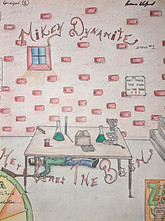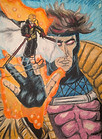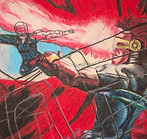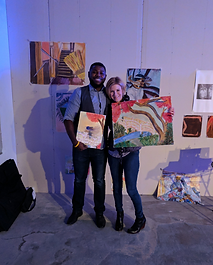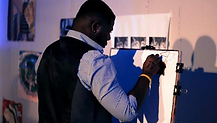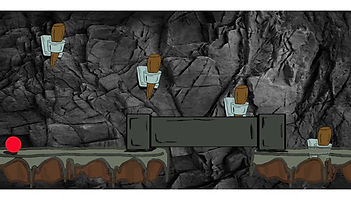
Entry 9: Page One, Again
Circa: 2025
Published: 09/15/2025
Tags: portfolio, growth, screenwriting, representation, new beginnings
After completing my portfolio in August, I’ve stepped fully into the next stage of this journey. Right now, I’m reaching out—sending cold inquiries to studios and managers in search of representation. I know the odds, but it feels important to take the leap, to put myself out there and invite possibility.
I'm also doing my first script trade, where another writer is reviewing Confidence while I review their TV pilot. It’s been exciting to step into this exchange—seeing different styles, sharpening my own feedback skills, and recognizing how far I’ve come as a screenwriter.
Most importantly, I’ve begun my second screenplay—another psychological thriller. This time, the process feels more grounded. I start with a single question, let it unravel into more questions, and slowly piece together the threads of story, character, and world. Watching a seed of an idea grow into something fuller reminds me of the joy I felt when Confidence first took shape.
It feels good to be back in the flow of creating while continuing to push my debut screenplay forward. With each step, I can see myself growing—not just as a writer chasing goals, but as someone finding rhythm, process, and voice.
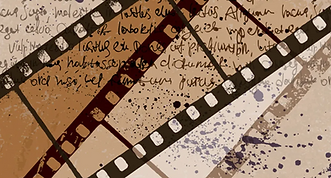

Entry 8: Today’s Chapter
Circa: 2025
Published: 08/26/2025
Tags: growth, momentum, creativity, portfolio, screenwriting, goals, industry
Currently, I am dedicating my energy and time to completing my portfolio. I’m not too far off from finishing, and once it’s ready, I’ll be sharing it with the world. I’ve taken a bit of a backseat on Stage 32 for now to focus on my portfolio, though I still check in occasionally—welcoming new creatives and keeping my presence felt while continuing to network.
Once my portfolio is complete, I plan to continue pushing CONFIDENCE forward and possibly explore representation, all while starting my second screenplay within the next couple of weeks—or at most, within a month. Momentum is building slowly but surely; I see people following my Instagram and engaging with my work. I remain hopeful, staying present and committed to my creative path.



Entry 7: My First Networking Events and Red Carpets
Circa: 2025
Published: 08/26/2025
Tags: milestones, inspiration, networking, industry, affirmation
Eventually, it was time to start networking. I attended my first networking event in July, which propelled me to create my screenwriting Instagram since I didn’t have business cards. This ended up being a blessing—I met like-minded creatives, shared my Instagram, and began building a space to display my work and personal branding to the world. I was nervous at first, unsure of how to approach people, but I found myself awkwardly saying, “Hey, how’s it going?” and gradually made some meaningful connections.
A couple weeks later, I attended the Stage 32 Shorts Program during the Hollyshorts Film Festival. Going alone, I was nervous, but it felt magical and guided. People were welcoming, asking if I was one of the filmmakers, and when I introduced myself as a screenwriter, they happily connected me with others. I met many creatives, shook hands, and immersed myself in the shorts program, seeing the beautiful work and hard effort everyone put in. Speaking with first-time filmmakers was inspiring—it reminded me why I’m pursuing this path and motivated me to keep networking and refining my craft.
Walking the red carpet and getting my photo taken wasn’t just a fun experience—it was a tangible reminder that I belong here as a screenwriter. Posting that picture later on Instagram felt like a reality shift, solidifying my identity and visibility in the industry.
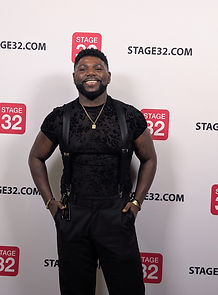
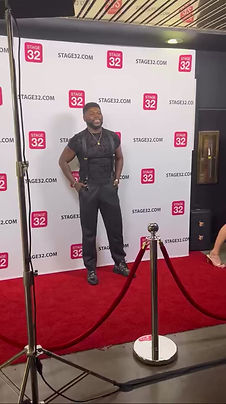
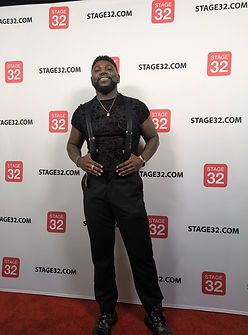
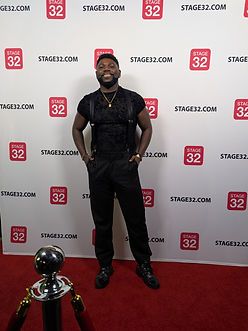
Entry 6: Joining Stage 32, Networking, and Learning the Industry
Circa: 2024–2025
Published: 08/26/2025
Tags: networking, growth, craft, community, industry
After completing the first draft of my screenplay, I focused on formatting and learning industry standards, guided by the Stage 32 community. Stage 32 became my hub for networking, asking questions, and connecting with fellow creatives. I attended free webinars, asking questions and posting weekly discussion threads to gain insight, show visibility, and build confidence within the community. Stage 32 was also a valuable space for refining my logline and synopsis, receiving feedback and critiques that helped me sharpen my story.
It was about more than just mastering the technical side of screenwriting—it was discovering where I fit in the creative landscape, understanding the industry, and learning how to put myself out there professionally. Connecting with people who had years of experience opened a new world to me, providing perspectives I hadn’t considered and helping me refine both my craft and my professional presence.


Entry 5: Character Profiles
Circa: 2023
Published: 08/26/2025
Tags: antagonist, pharmaceutical thriller, psychological drama, science and obsession, family conflict, moral corruption
Character: Dr. Victor Evans
Age: 55
Role: Anti-hero
Height: 5’8 – 5’9
Weight: 160 – 175 lbs
Bio: Victor Evans is the CEO of Leinad Labs, husband to the late Ella Evans, and father of Daniel Evans. Once a bullied child, Victor became a brilliant scientist, but the combination of personal trauma and the death of his wife left him isolated. Driven to create “C”—a drug meant to conquer depression and boost confidence—Victor becomes consumed by his obsession after the drug backfires, causing death and societal chaos. His pursuit of perfection and control over “C” eclipses empathy, leaving him morally compromised.
Character Traits
Internal:
- Genius and Visionary: Victor is fueled by intense intellectual curiosity and ambition, believing he can change the world through pharmacology.
- Loneliness and Resentment: Years of bullying have left him with a deep-seated need for validation and revenge.
- Emotional Numbness: The loss of his wife has left him disconnected from feelings of empathy or remorse.
Active:
- Obsessive Researcher: Victor prioritizes perfecting “C” over ethical boundaries, putting lives at risk.
- Manipulative and Cunning: He deceives investors and colleagues to maintain control over his work.
- Calculated Ruthlessness: Victor will sacrifice anyone, even former tormentors, to achieve his goals.
Conflict Relationship
- Primary Conflict: Victor struggles between the noble vision he once held for “C” and the dark consequences of his ambition. His strained relationship with Daniel represents both his last human connection and the moral line he continues to cross.
- Key Opposing Force: Daniel Evans, his son, embodies the ethical approach Victor has lost and challenges his dangerous pursuit of power.
Primary Goal:
To achieve validation for his life’s work and perfect “C” into the ultimate cure for human suffering—though this is entangled with a desire to assert control and superiority over those who once belittled him.
Motivation:
Victor is driven by a mix of idealism and vengeance, aiming to be recognized as the revolutionary mind who defeated depression. Grief over his wife’s death intensifies his obsession with “C” and fuels his relentless drive.
Development Arc:
Victor begins as a visionary scientist seeking to eradicate depression, but personal loss and unchecked ambition lead to moral compromise. By the end of the film, his actions culminate in catastrophe.

Character: Daniel Evans
Age: 34
Role: Protagonist
Height: 5’10 – 6’1
Weight: 185 lbs – 200 lbs
Bio: Daniel is the son of Victor and Ella Evans. Raised in a home that seemed idyllic until his mother’s death during one of Victor’s experiments with “C,” Daniel grew resentful of his father and left home to join the Marines. His military experience shaped him into a disciplined, resilient man with a strong moral compass. Upon returning home, Daniel’s protective instincts emerge as he navigates the chaos unleashed by his father’s creation and crosses paths with Selene, whose life intertwines with his as the epidemic spreads.
Character Traits
Internal:
- Emotional Void: Struggles with a lingering sense of emptiness after his mother’s death.
- Guarded & Self-Reliant: Years of estrangement taught him to depend on himself.
- Inner Conflict: Balances his desire to protect others with fear of vulnerability.
Active:
- Fearless Protector: Military-trained instincts make him a natural shield for those in danger.
- Stubborn Leader: Determined to lead, even if it causes tension.
- Driven by Justice: Seeks to expose his father’s wrongdoing and rectify the harm caused by “C.”
Conflict Relationship
- Primary Conflict: Struggles with guilt over leaving home and losing his mother, driving him to seek purpose and redemption.
- Key Opposing Force: Victor Evans (Anto-hero), whose moral decay and ambitions challenge Daniel’s values and ignite a deeply personal struggle.
Primary Goal:
Daniel wants to find purpose and redemption by protecting others and standing against his father’s dangerous creation. This journey helps him confront past guilt and redefine his own worth.
Motivation:
A deep desire to reconcile his past, protect others, and prove his value beyond combat drives Daniel. His mother’s death and estrangement from his father shape his need to act with moral integrity.
Development Arc:
Daniel starts as a man defined by loss and self-doubt. The chaos caused by “C” forces him to confront his insecurities and past trauma. Over the course of the film, he grows into a trusted leader who learns to trust both himself and others, ultimately redefining his sense of purpose and strength.
Character: Ella Evans
Age: Died at 26 (1995, during Trial #1 of “C”)
Role: Catalyst Character
Height: 5’5
Weight: 125–135 lbs
Bio: Ella was the supportive wife of Dr. Victor Evans and the mother of Daniel Evans. She met Victor in 1988, married him, and had Daniel in 1989. A devoted partner and mother, Ella was deeply involved in Victor’s scientific work. In 1995, she became the first test subject for Victor's trial of “C.” While the drug initially boosted her confidence and gave her manipulative tendencies, by the 6th day she began exhibiting violent behavior. On the 7th day, after a violent outburst, Victor locked her in a room, where she tragically died due to complications from the drug. Her death marked the start of Victor’s obsessive pursuit of “C” and left a permanent emotional scar on Daniel, shaping the family’s future.
Character Traits
Internal:
- Selfless Loyalty: Devoted to supporting her family and Victor’s work, even at personal risk.
- Unquestioning Support: Trusted Victor fully, leaving her vulnerable to the consequences of his experiments.
- Tragic Sacrifice: Her willingness to volunteer for the trial ultimately led to her death and shaped Daniel’s path.
Active:
- Caring Mother and Wife: Her love and nurturing defined her role in the family.
- Brave Experimenter: Volunteered as the first test subject for “C” to support Victor’s work.
- Unaware Victim: Her death highlights the human cost of unchecked ambition and experimentation.
Conflict Relationship
- Primary Conflict: Her unwavering loyalty to Victor blinds her to the dangers of “C,” culminating in her death.
- Key Opposing Force: Victor, whose ambition and moral compromises create the conditions for her tragic demise.
Primary Goal:
To support Victor’s scientific pursuits while ensuring her family’s well-being.
Motivation:
Love for her family and trust in Victor’s vision drive her to participate in the first “C” trial, believing it could advance science and benefit humanity.
Development Arc:
Ella’s arc begins as a loving, supportive wife and mother. Initially, the drug enhances her confidence and abilities, but it quickly turns dangerous. Her death becomes the catalyst for Victor’s obsession and Daniel’s journey toward justice, leaving her influence felt throughout the film.
Character: Selene Carter
Age: 31
Role: Deuteragonist / Love Interest
Son: Julius Carter (9)
Height: 5’7
Weight: 130–140 lbs
Bio: Selene is the daughter of Dr. Rowan Carter, who died during trial #3 of “C” in 1999. Losing her father at age 7 shaped her into a tough, independent, and emotionally guarded young woman. At 20, she met Christopher, and by 22, they had a son, Julius. Tragically, Christopher died in military service before they could marry, leaving Selene to raise Julius alone. Later, she crosses paths with Daniel, forming a complicated bond during the “C” epidemic. She navigates grief, betrayal, and love while striving to protect her son and uncover the truth about her father’s death.
Character Traits
Internal:
- Trauma Survivor: Her early losses and ongoing challenges have shaped her strength and emotional resilience.
- Resilient: Capable of facing hardship head-on while managing the care of her son.
- Emotionally Guarded: Keeps her heart protected, especially around men and those she doesn’t fully trust.
Active:
- Protective Mother: Julius’ safety and wellbeing are her top priority.
- Independent Leader: Uses her nursing background and life experience to navigate crises.
- Reluctant Ally: Hesitant to trust Daniel at first, but develops a bond as they confront “C.”
Conflict Relationship
- Primary Conflict: Reconciles grief and trauma with trust and forgiveness, particularly with Daniel after learning his childhood involvement in her father’s death.
- Key Opposing Force: Victor Evans, whose creation of “C” triggers the tragedy that frames Selene’s life and relationship with Daniel.
Primary Goal:
To protect Julius, raise him in a stable environment, and uncover the truth behind her father’s death, ultimately learning to trust and forgive.
Motivation:
Driven by love for her son, fear of further loss, guilt over past events, and the desire for justice and closure.
Development Arc:
Selene evolves from emotionally closed-off and solitary to a strong, capable protector and leader. She confronts betrayal and grief, ultimately learning forgiveness, trust, and self-reliance while ensuring Julius’ safety and wellbeing.
Character: Dr. Rowan Carter
Age: Died at 28 during Trial #3 (1999)
Role: Motivational Figure / Sacrificial Arc
Height: 5’9 – 6’0
Weight: 160–180 lbs
Bio: Dr. Rowan Carter was a skilled pharmaceutical technician who worked closely with Victor Evans on the experimental drug “C.” A dedicated father to Selene after the death of her mother, Rowan tried to balance ambition with ethics. In 1999, he became the test subject for Trial #3 of “C.” Though the drug initially seemed successful, the combination of “C” and its counteracting drug, “Anti-C,” ultimately led to his death. Rowan’s passing left a profound impact on Selene and shaped her resilience and guarded nature.
Character Traits
Iternal:
- Supportive yet Naive: Rowan’s loyalty to Victor blinds him to the full dangers of the drug trials.
- Devoted Father: His connection to Selene drives his decisions and underpins his motivations.
- Ethically Grounded: He strives to act morally, even when ambition clouds judgment.
Active:
- Ambitious Careerist: Rowan pursues recognition and advancement in the medical field.
- Hesitant Enabler: He is swayed by Victor’s persuasive leadership despite reservations.
- Family-Oriented Provider: His actions aim to secure Selene’s well-being and stability.
Conflict Relationship
- Primary Conflict: Balancing ethics with ambition, Rowan struggles to support Victor while protecting his daughter, unaware of the trial’s eventual dangers.
- Key Opposing Force: Victor Evans, whose charisma and promises of success lead Rowan into a fatal entanglement with “C.”
Primary Goal:
To provide for Selene and advance his career, seeking both familial stability and professional recognition, even as his involvement in Victor’s trials compromises his safety.
Motivation:
Rowan is motivated by love for his daughter and the desire to secure a better future, coupled with ambition for professional achievement.
Development Arc:
Rowan’s journey is one of responsibility and selflessness. His commitment to Selene shapes every decision, yet his ambition and loyalty to Victor pull him into tragic circumstances. Though he dies young, Rowan’s actions underscore the tension between ethical intention and unforeseen consequences, leaving a legacy that shapes Selene’s resilience and path forward.

Character: Josh Mathers
Age: 57
Role: Static Character
Height: 5’10 – 6’1
Weight: 190–210 lbs
Bio: Josh Mathers was a wealthy and influential figure in the pharmaceutical industry, sitting on the board of multiple major companies. In high school, he bullied Victor Evans relentlessly, including a public humiliation that nearly drove Victor to suicide. As an adult, Josh became an unwitting participant in Victor’s plans when he financially backed Trial “5” of the “C” drug. Victor ultimately frames Josh for the trial’s disastrous outcome, leading to his public disgrace and death.
Character Traits
Internal:
- Toxic Influence: Used wealth and power to dominate others, carrying his bullying into adulthood.
- Apathetic to Consequences: Shows little empathy or awareness of the harm caused by his actions.
- Forgetful of the Past: Fails to remember his torment of Victor, highlighting his self-centered worldview.
Active:
- Pharmaceutical Powerbroker: Controlled large-scale projects through financial influence.
- Wealth-Driven Decision-Maker: Makes choices for profit and status, ignoring human cost.
- Silent Catalyst: Unknowingly enables Victor’s revenge by funding Trial “5.”
Conflict Relationship
- Primary Conflict: Josh is oblivious to the full consequences of his actions and past bullying. His self-interest blinds him to Victor’s lingering trauma, making him an unwitting target.
- Key Opposing Force: Victor Evans, whose life was shaped by Josh’s cruelty. Victor’s revenge and framing of Josh exploit his past ignorance and apathy.
Primary Goal:
To maintain and expand his wealth and influence in the pharmaceutical industry, prioritizing personal gain and industry status above all else.
Motivation:
Driven by greed and self-preservation, Josh seeks to protect his empire and control over his financial ventures, indifferent to the damage inflicted on others.
Development Arc:
Josh’s story remains largely static, with his downfall coming not from internal growth but from his ignorance and self-serving actions. Initially untouchable, his funding of Trial “5” sets him up for Victor’s revenge. His arc ends in public disgrace and death, a tragic result of arrogance and willful ignorance.
Character: Julius Carter
Age: 9
Role: Child
Height: 4’4 – 4’7
Weight: 62–68 lbs
Bio: Julius is the son of Selene Carter and the late Christopher, who died before Julius was born. Raised solely by Selene, he is a perceptive and caring child who senses when his mother is struggling. Julius represents stability and love in Selene’s life, helping anchor her as she navigates the challenges of raising him alone amidst the fallout of “C.”
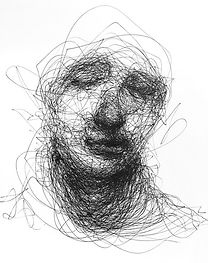
Character: Dr. Charles Grant
Age: Died at 42 (1987)
Role: Mentor
Height: 5’10 – 6’2
Weight: 180–200 lbs
Bio: Dr. Charles Grant was the head of The Helping Hands Institution, where Victor Evans was placed at age 15. As Victor’s mentor, Dr. Grant nurtured his intellectual curiosity and guided him toward the pharmaceutical field. A protective and ethically driven figure, he ensured Victor’s safety and well-being while fostering his potential. Dr. Grant passed away from cancer in 1987, leaving a lasting influence on Victor’s life and career trajectory.
Character Traits
Internal:
- Nurturing Mentor: Guided Victor with care, patience, and belief in his potential.
- Protective Figure: Advocated for Victor’s safety within the institution.
- Ethically Driven: Committed to helping those in his care, even when the system was imperfect.
Active:
- Academic Leader: Shaped the therapeutic and educational environment at the institution.
- Legacy Builder: Inspired Victor’s later pursuits in pharmaceuticals, indirectly shaping the events around “C.”
- Compassionate Authority: Balanced professionalism with empathy, earning trust and respect.
Conflict Relationship
- Primary Conflict: Balancing his mentorship and care for Victor with an inability to foresee the consequences of encouraging Victor’s ambitions.
- Key Opposing Force: Victor Evans—whose growing ambition, nurtured by Dr. Grant, leads to morally questionable decisions and the “C” trials.
Primary Goal:
To mentor and guide troubled youth, especially Victor, providing them with the tools, care, and direction to make meaningful contributions in life and work.
Motivation:
Driven by duty, compassion, and a belief in the transformative power of mentorship, Dr. Grant wants to help his patients realize their potential while ensuring their well-being.
Development Arc:
Dr. Grant’s story revolves around the bittersweet consequences of mentorship. He genuinely seeks to guide Victor positively, but his encouragement unintentionally lays the foundation for Victor’s darker choices. Though his intentions are pure, his legacy is marked by the tragic irony that his guidance indirectly leads Victor down a destructive path.
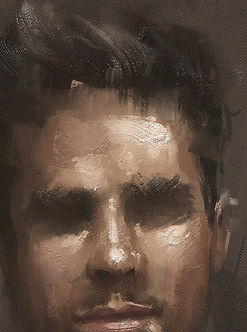
Entry 4: What’s in C?
Circa: 2023
Published: 08/26/2025
Tags: psychological thriller, sci-fi, experimental drug, mind control, confidence, manipulation, psychosis, LSD, serotonin, epinephrine, addiction, morality, dystopia, neuroscience, biochemistry, Anti-C, stabilization
What is “C”?
“C” — short for Confidence — is the drug Victor develops. The more of it you consume, the more control you gain over others. Your confidence sharpens into mental dominance, manipulation, and gaslighting. It’s like a hypnotic spell over those with weaker willpower.
Anti-C:
Victor created Anti-C as a stabilizer to “C.” While “C” amplifies confidence and manipulative abilities, it carries deadly side effects if taken beyond day 7. Anti-C reverses these negative effects while preserving the positive ones, allowing continued use of C safely — but only if both drugs are administered daily. Anti-C’s formula is a closely guarded secret known only to Victor, giving him ultimate control over who survives and who wields true confidence.
Effects Over Time:
- First 24 hours: Noticeable boost in confidence.
- Day 5: Heart rate accelerates; chemical changes in the brain trigger violent impulses.
- Day 7: The body begins to fail — death is inevitable without intervention. Anti-C can stabilize the user, neutralizing violent tendencies and preserving heightened confidence.
- Beyond Day 7: C without Anti-C causes organ failure and increased aggression. Daily dosing of both drugs maintains elevated confidence safely, but withdrawal or misuse of either is fatal.
Core Chemical Concept:
Victor engineered “C” to mimic and amplify the body’s natural confidence chemicals — but at extreme, dangerous levels. Anti-C works alongside C to counteract its destabilizing effects, acting as a safety regulator without diminishing the drug’s potency.
Key Ingredients of C (effects enhanced by Anti-C):
- Lysergic Acid Diethylamide (LSD): Alters perception; historically studied for anxiety and depression.
- Serotonin: Regulates mood, sleep, and confidence.
SSRIs & SNRIs (e.g., Venlafaxine): Elevate serotonin/norepinephrine to reduce anxiety, boosting self-image.
- Endorphin Mimics: Synthetic opioids amplify natural euphoria and confidence.
- Epinephrine (Adrenaline): Heightens alertness and energy, intensifying C’s effects.
Victor’s Goal:
To trick the brain into sustained euphoria and self-assurance while controlling the balance of power. Anti-C allows him to maintain that control, stabilizing users at peak confidence and giving him leverage over those who might otherwise surpass him.
Testing Protocol for “C” and Anti-C:
- Trial Length: 7+ days (C daily; Anti-C administered as needed post-day 7)
- Location: Secured rooms at Leinad Labs
Stages:
- Stage 1 (Day 2): Elevated confidence emerges.
- Stage 2 (Day 5): Heart rate accelerates; violent impulses arise.
- Stage 3 (Day 7): Bodily systems fail without Anti-C. With Anti-C, confidence stabilizes and violent tendencies are neutralized.
Critical Warning: C alone after Day 6 is fatal. Anti-C must be paired with C to maintain life and preserve positive effects.
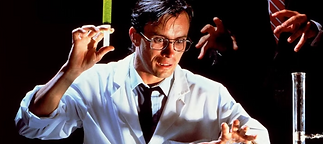
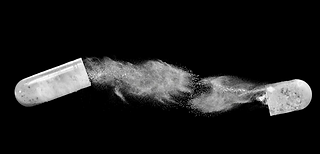




Entry 3: The Birth of Confidence
Circa: 2023–2024
Published: 08/26/2025
Tags: screenwriting, creation, process, inspiration, perseverance, character development, storytelling, formatting, industry standards
The Draft Marathon: (January 2023 – July 2024)
In January 2023, I began writing Confidence. With no formal screenwriting training, I learned the craft as I went, slowly building the story and exploring its characters. Each draft taught me something new about structure, pacing, and character voice.
My process was highly introspective and methodical. I would ask myself questions from different perspectives: What’s the setting of this city? What does it feel like? What names and identities populate this world? Each answer would spark a new question, and that chain of curiosity became the foundation of the script. Researching the screenwriting process — from character ideation to treatments, outlines, loglines, and synopses — became part of my daily practice.
The first draft was slow, deliberate, and deeply personal. I intentionally avoided rushing myself, knowing that pressure would dilute my passion. By July 2024, I had completed the first draft— a reflection of my journey, infused with themes of self-worth, societal pressure, and personal growth. Around that same time, I had taken another important step — officially registering CONFIDENCE with the U.S. Copyright Office in July 2024. It was more than just paperwork; it was a milestone that made the story feel real, protected, and ready to face the world.
Even with the first draft complete, the journey didn’t end there. Sharing my work on networking platforms, especially Stage 32, gave me the first breadcrumbs of industry insight. One comment nudged me to refine formatting and explore professional tools, which led me into the next phase of my writing.
Rewrites & Refinement: (July 2024 – July 2025)
The next stage was about polishing, restructuring, and formatting. I learned to let go of scenes, lines, or imagery that didn’t move the story forward — a tough but necessary step to keep the heart of the narrative strong. I explored the works of writers I admire, like Jordan Peele, to understand how they build visual imagery, pace dialogue, and convey character psychology on screen.
Using the free version of Arc Studios, I meticulously rewrote and reformatted the script to industry standards. Each revision deepened my understanding of screenwriting as a visual medium — how to “paint” the characters’ inner thoughts, emotions, and actions for the audience to experience without relying on narration. By July 2025, the screenplay was fully polished, formatted, and ready for professional review.
This process was transformative. It wasn’t just about completing a script; it was about developing discipline, patience, and confidence in my voice as a screenwriter. The journey of CONFIDENCE became a mirror for my own growth, reflecting not only my creative evolution but also my personal resilience.
Entry 2: Leap to LA, Healing and Discovery
Circa: 2021–2022
Published: 08/26/2025
Tags: transition, courage, independence, ambition, growth, healing, mental health, spirituality, self-discovery, transformation
The idea of moving to Los Angeles first surfaced in 2020. During the pandemic, I was living with one of my college friends for a while—he had previously lived in LA for a year before moving back to Chicago, and in our conversations, the possibility began to take root.
The following year, in 2021, we moved into our own apartment together in Chicago. Not long after, I told him I was ready to make the leap on my own. He stayed behind, and I began preparing for my solo move to Los Angeles.
It felt spiritually guided from the start. I was booking a U-Haul U-Box service to ship my belongings across the country, virtually touring apartments while still in grad school working on my thesis, all during the ongoing pandemic. Despite the uncertainty, I kept feeling this quiet pull forward—as if I was exactly where I needed to be.
Arriving in LA was both thrilling and challenging. I left behind a vibrant social life and community in Chicago. As an extrovert, I didn’t expect how much being on my own would stretch me. There were moments of loneliness, but they were met with a deeper realization: I needed to discover who I was without the safety net of a familiar circle.
I landed my first job in Los Angeles at a branding and merchandise company. But after six months, mental overwhelm set in, and I made the difficult decision to leave. What followed were some of the hardest months of my adult life—eviction notices, depression, and uncertainty. I kept moving forward, relying on unemployment benefits and resourcefulness until I landed a role at TikTok HQ in Culver City. My team was supportive, and I began to make connections, but the tech world wasn’t aligned with me, and feelings of depression lingered.
By late 2022, I reached a turning point. I felt called to go inward and began a deep spiritual healing journey. It became a year of intentional self-work—meditation, journaling, and daily spiritual practices that reshaped how I saw myself. I realized that confidence, creativity, and self-worth weren’t just traits I could borrow from my environment—they were disciplines I needed to nurture within myself. This inner work wasn’t easy, but it became the catalyst for my next creative leap.
I had always thought of myself as confident, but I began to question if that confidence had been tied to the people and community around me. Now, in LA, I had to build it from within. That’s when I felt the pull back to storytelling—a lifelong instinct of mine. I wanted to create something that reflected where I was in my journey while making a meaningful impact. That spark became my first and current screenplay, CONFIDENCE.



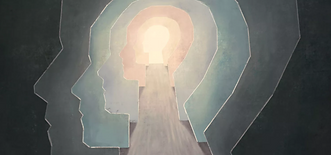

Entry 1: The Spark + The Formative Years
Circa: 1996–2021
Published: 08/26/2025
Tags: inspiration, creativity, childhood, storytelling, journey, education, skill-building, ambition, creativity, multimedia
I remember being around 6 years old at my granny’s house, completely locked in on a pile of colorful construction paper and a couple of pencils. I’d draw human figures—mostly women at first—then obsess over the details: outfits, hair, the vibe. It wasn’t just “a drawing.” I wanted to know who they were. So I started building little storylines around them.
By the time I hit my early teens, I’d graduated from characters to whole worlds. My notebooks filled up with TV shows, movie scripts, and hand-drawn storyboards. I created an entire entertainment ecosystem: talk shows, bands, and even my own wrestling program (WWF/WWE inspired, of course). I invented hundreds of actor names and cast them across my shows. I voiced every character. Hours would disappear—me on the floor, fully immersed—like nothing outside that world existed. Summers went to the comic books I wrote and illustrated from scratch; they’d take the whole season, and finishing them felt like magic.
Art was so baked into me that I’d get in trouble for drawing in class. Once, a teacher told me to stop and I basically said, “I can’t,” and got sent to the disciplinarian. I literally used to sketch on everything—assignments, work projects. That's how deep it was. I bounced between two high schools, and the one I graduated from was a school of entrepreneurship. Everyone had to build a business and make a profit. Mine was a logo business called R Logos—for “Ryan,” and also “Our”—designing marks for other student companies. I lived in the art room after school, building a real relationship with my art teacher and pushing myself to impress them.
Disney and Pixar were my north stars. Knowing those films started as sketches made the whole thing feel possible. For years, I wanted to be an animator at Pixar. So I studied Time Arts at Northern Illinois University in DeKalb, IL—animation, video, audio, game design—the full multimedia toolkit. College is where I became truly multifaceted. My senior project was an abstract piece about my claustrophobia—my first time turning a personal fear into an art experience. I started showing work at art shows, meeting artists, and feeling part of a creative community for the first time.
I also joined a fraternity and found another lane: graphic design. I made flyers and event promos, which pulled me toward branding. That evolved into my own company, Royal 2 Designs. I built a site, printed business cards, and ran with it—I even brought some of my fraternity brothers onboard. Juggling multiple clients by hand was challenging, but it was the first time I saw my art move in the real world.
After finishing undergrad and before heading to grad school, I had an experience that changed my perspective on my art. I met a guy who became a friend and sort of like my unofficial "art agent," helping me find opportunities to paint live at music shows and underground warehouse events. This was a completely new world for me, but it was at one of these shows that I sold my first piece. A woman bought one painting, and then another, and that moment was a powerful realization: my art had a place in the world. Being on stage, creating alongside other performers, and having people connect with my work was incredibly inspirational and gave me the confidence to put myself out there.
Grad school at DePaul University (MA in Digital Communication and Media Arts) leveled me up again. I got behind the camera, produced podcasts, experimented with VR game creation, and fell in love with transmedia—telling one story across different mediums and angles. I collaborated with other artists and made short video pieces I still look back on proudly. Even as my practice expanded away from purely drawing the human figure, that foundation never left me—it lives in everything I make and it’s always waiting to circle back.
Every project—class assignment, client gig, or personal piece—sharpened my storytelling. In 2021, I graduated, came out as bisexual/gay, and on July 4th, 2021, I closed my Chicago chapter and moved to Los Angeles. The kid on the floor with the construction paper had grown up—but he was still here, still building worlds.




